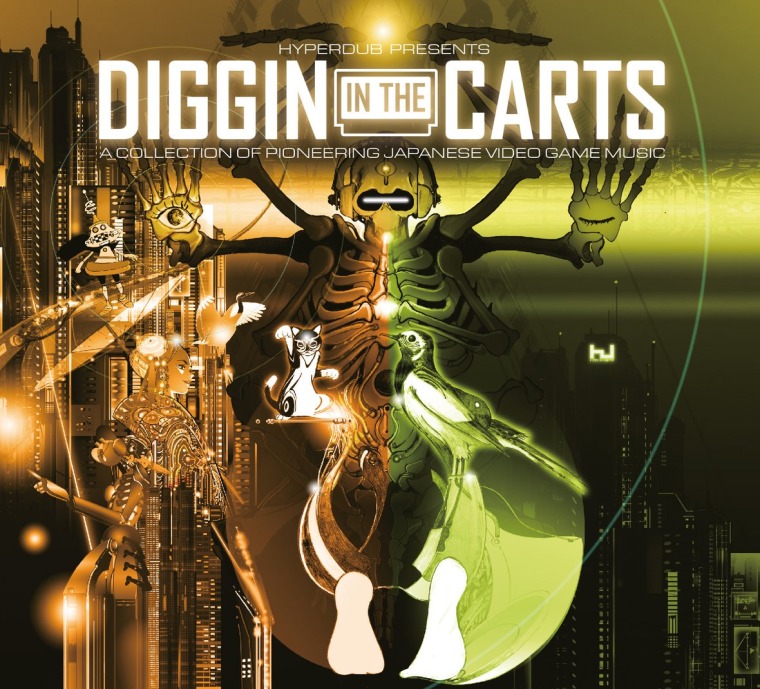Kode9’s new Japanese chip compilation will change your perspective on video game music
Diggin In The Carts, co-curated by Red Bull Music Academy’s Nick Dwyer, is a loving testament to an overlooked genre.
 Kode9.
Photo by David Levene
Kode9.
Photo by David Levene
Diggin In The Carts is an upcoming 34-track collection of rare and compelling Japanese chip music from the ‘80s and early ‘90s, based on the radio show and documentary series created by Red Bull Music Academy’s Nick Dwyer. His co-curator and researcher on the compilation is an exciting one: Steve Goodman, a.k.a Kode9.
As an established authority on electronic music, the Hyperdub founder is an ideal choice for the project. But he’s also a surprising one, given how totally unconcerned he is with the (often misogynistic) qualifications of who is and is not a “real” video game authority. “I love video games, I'm fascinated by them, but I'm not a huge gamer because I just don't have time,” he tells me over the phone from his home in London. Still, he lovingly describes the “ASMR-like brain tingles” he receives from the synths and drums in chip music, “a kind of under-potentiated sound” that branched off into sinogrime, a micro-microgenre of grime inspired by martial arts films and video games (the sound and its cultural implications were explored on Fatima Al Qadiri’s 2014 album Asiatisch, released on Hyperdub).
In 2015, Dwyer approached Kode9 with an idea for a collection of Japanese chip-era music, and sent hundreds of selections in the following months. Upon receiving a new batch, Kode9 would plug in his headphones and go for a run, “just to empty my brain out and just live with music.” You won’t find a tune from Sonic, Mario, or even Streets of Rage in the resulting tracklist, which was intentional: Kode9 believes that the music doesn’t need such high-profile crutches to exist as a body of work, and it’s hard to argue with him after listening to the album.
The FADER spoke to Kode9 about how chip music changed Hyperdub’s direction, how technological limitations can create unexpected genius, and whether or not video games are art.
Was there a particular moment when you took chip music seriously as an art form?
It was quite recently. It was probably a lot to do with the influence of grime and what was going on in dubstep at that time, and hearing the Quarta 330 release that we did in the mid 2000s. He did a kind of 8-bit version of "9 Samurai," and that was like a crucial turning point for me and the label, because I was getting kind of bored of dubstep for being too monochrome. For me he seemed like he was doing something different that was more than just nostalgia or retro-fetishization. This is around the same time as Scream's "Midnight Request Line," which became a prototype for me at least for what dubstep was missing and how to do it, these kind of hypercolour, Technicolour synths. I just became more aware of how much I'd always had a soft spot for video game soundtracks, and the Quarta 330 [remix] led to me signing a lot of different music for Hyperdub had some of those characteristics, stuff like Ikonika or Zomby, and so on, stuff that was one way or another clearly influenced by early video game music.
You also taught video game music in a sound design course.
It was an interactive sound course and part of what we did was look at the history of video game music, just the crucial thresholds. For example, when the chips changed [and got] more powerful going 8-bit to 16-bit and the impact that had on the sound. And I think the thing we were most interested in was people being ingenious artists within technical limitations; it often produces something that's unintentional to the people who design the technology.
Is that what primarily appeals to you about the chip era of Japanese video game music?
One thing that interests me about game music is that as the technology has become more powerful and more sophisticated, the music has gone from having a very specific sound [that’s] determined by the limitations, to the music in video games being able to be any music at all. So, the music in video games [today] became more hyperreal in order to become more interactive, and it lost its specificity. Grand Theft Auto, for example. It's not that the music is worse now than it was, it's just interesting to me.
The second thing is, I'm fascinated by how the early video game music has survived this long. And one of the reasons is because it stands on its own two feet as sophisticated, fun, cool electronic music, separate from the games. It has an identity too in a way that game music now might be cool music but it doesn't have an identity of its own. The early stuff created its own genre.
 Diggin In The Carts artwork.
Art by Koji Morimoto
Diggin In The Carts artwork.
Art by Koji Morimoto
The criteria for the compilation is not about giving people warm fuzzy feelings from their childhood. It’s just, This is a fucking amazing genre of Japanese electronic music from the ‘80s and ‘90s.
Were you ever concerned when you took this project on that it would just be superficially defined as a nostalgic release?
Yeah, definitely. I don't really have that much to say about nostalgic childhood memories [of video games], because this was a totally different thing for us. It's not that I wish there was a lot more music sounding like video game music in the 90s, it’s not that either. The criteria for the compilation is not about giving people warm fuzzy feelings from their childhood. It's just, This is a fucking amazing genre of Japanese electronic music from the ‘80s and ‘90s. Let's take it as that as opposed to just the accompaniment of the games.
I still have this feeling that a lot of Japanese electronic music — not just game stuff, but Japanese electronic music from the '80s — it sounds to me more futuristic then a lot of music that has come after. In a way, for me, I'm hearing this compilation not just in the context of early video games but also in the context of like Yellow Magic Orchestra, early electronic [Ryuichi] Sakomoto, and all the artists associated with Yen Records which was an offshoot of YMO. To a certain extent it's slightly uncharacteristic of some of the other ways I've tried to run Hyperdub, in the sense that it does have that throwback orientation. But I think the music is strong enough for that not to be an issue.
I think this collection really stands apart because every piece of music is obscure.
I have fond memories of playing games when I was younger, but not specifically of the soundtracks because they’re always seeped in subliminally. That's part of the power of video game music and why it affected so many people's youth: you're sitting there in this situation of being addicted to a certain game and trying to get better. The early video game music plays an interesting role in that addiction because it tends to be so repetitive, it’s kind of disciplining you into this game mode. You know, if you get further in the game it reveals a little bit more music.
A lot of [playing video games] has to do with upgrading the human nervous system in terms of reaction times and hand-to-eye coordination, and just general proprioception. Now, one thing games do is really tighten up that cybernetic loop between humans and machines because it trains the body to react very fast to what's going on on-screen. So video games are a primary agent in this kind of accelerated cultural period that we're living in — primary agents for accelerating reflexes of the body and brain response times and, most bluntly, shooting skills, killing skills. Now obviously, That's a lot of fun [laughs]. I can see a lot of fun in becoming an automated drone warrior.
Final question: where do stand on the “Are video games art?” debate?
Of course they are! Without a doubt.


